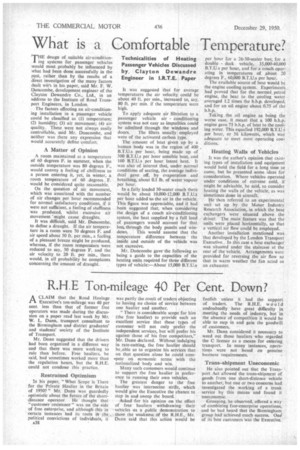R.H.E Ton-mileage 40 Per Cent. Down?
Page 56

If you've noticed an error in this article please click here to report it so we can fix it.
ACLAIM that the Road Haulage Executive's ton-mileage was 40 per cent. less than that of former free operators was made during the discussion on a paper read last week by Mr. W. L. Dann, transport consultant to the Birmingham and district graduates' and students' society of the Institute of Transport.
Mr. Dann suggested that the drivers bad been organized in a different way and that there was more working to rule than before. Free hauliers, he said, had sometimes worked more than the regulation hours, but the R.H.E. could not condone this practice.
Restrained Optimism In his paper, "What Scope is There for the Private Haulier in the Britain of 1950?" Mr. Dann was guardedly optimistic about the future of the shortdistance operator. He thought that "customer resistance" was on the side of free enterprise, and although this in certain instances had its roots in the., political convictions of individuals, it
a38 was partly the result of traders objecting to having no choice of service between one haulier and another.
"There is considerable scope for him (the free haulier) to provide such an excellent service that these types of customer will not only prefer the independent services, but will prefer his against those of his free competitors," Mr. Dann declared. Without indulging in rate-cutting, the free haulier should be,able so to organize his services that on that question .alone he could comvete on economic terms with the nationalized body and win.
Many such customers would continue to support the free haulier in preference to running their own vehicles.
The greatest danger to the free haulier was internecine strife, which would give the Executive the chance to step in and sweep the board.
Asked for his opinion on the effect of free hauliers withdrawing their vehicles as a public demonstration to show the weakness of the R.H.E., Mr. Dann said that this action would be foolish unless it had the support of traders. The R.H.E. would undoubtedly have great difficulty in meeting the needs of industry, but in the absence of competition it would be able to step in and gain the goodwill of customers.
Mr. Dann considered it necessary to weed out those hauliers who regarded the C licence as a means for entering transport. In many instances, operations were not based on genuine business requirements.
Trans-shipment Uneconomic
He also pointed out that the Transport Act allowed the trans-shipment of goods from one short-distance vehicle to another, but one or two concerns had investigated the working of a trunk service by this means and found it uneconomic.
Grouping, he observed, offered a way of combining free-enterprise operations, and he had heard that the Birmingham group had achieved much success. Ond of its best customers Was the Executive.




















































































